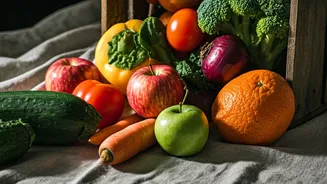Defining Real Organic
Real organic food is cultivated and produced in a way that respects the environment and prioritizes human health. The term “real organic” goes beyond mere
labeling; it signifies adherence to specific agricultural practices that exclude synthetic pesticides, fertilizers, and genetically modified organisms (GMOs). These stringent guidelines ensure that the food is produced with minimal impact on ecosystems and with a focus on preserving the natural integrity of ingredients. Choosing real organic food supports sustainable farming, protecting biodiversity, and promoting soil health. Therefore, the core of real organic food lies not only in what's absent (synthetic inputs), but also in what is present – a dedication to ecological harmony and consumer well-being.
Seeking Certifications
One of the most reliable ways to identify real organic products is by looking for certifications. These certifications are provided by independent organizations that verify farms and processors are adhering to specific organic standards. The presence of a recognized organic certification logo on a product’s label is a guarantee that it has met rigorous requirements throughout its production process, from the farm to the store shelf. In India, look for certifications like Jaivik Bharat or similar governmental or third-party endorsements. Checking for these certifications helps ensure that the food you're purchasing aligns with organic principles, assuring you that the product's origin and methods of production uphold environmentally friendly practices and contribute to your overall health.
Decoding Food Labels
Understanding food labels is a vital step in choosing authentically organic food. These labels contain important details about ingredients, origin, and manufacturing processes. To begin, always inspect the ingredient list, and look out for words like 'organic' or 'certified organic'. These terms usually point to products that have been produced in compliance with the organic standards. Furthermore, observe the packaging for the organic certification logo from trusted authorities. By taking the time to read and understand food labels, consumers can make informed decisions. Careful reading allows individuals to assess the product's alignment with their personal values, such as their commitment to organic practices and commitment to environmental sustainability and health.
Smart Shopping Strategies
To effectively put your knowledge into action, follow some smart shopping tips. Before starting, plan your meals and make a shopping list to avoid impulse buys, which often include less healthy options. When you arrive at the store, begin by visiting the produce section, as this is where you'll find the freshest, most unprocessed organic foods. When shopping, prioritize whole, unprocessed foods like fruits, vegetables, and lean proteins. Try to choose products with a short ingredient list. Compare products to ensure you're getting the best value. Furthermore, supporting local farmers markets and organic food stores is a good habit. These outlets typically offer a broader range of organic products, often sourced from local farms, reducing your carbon footprint and supporting the community.













